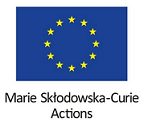Marie Skłodowska-Curie Actions
The Marie Skłodowska-Curie Actions fund excellent research and innovation and equip researchers at all stages of their career with new knowledge and skills, through mobility across borders and exposure to different sectors and disciplines. The MSCA help build Europe’s capacity for research and innovation by investing in the long-term careers of excellent researchers.
The MSCA also fund the development of excellent doctoral and postdoctoral training programmes and collaborative research projects worldwide. By doing so, they achieve a structuring impact on higher education institutions, research centres and non-academic organisations.
The MSCA promote excellence and set standards for high-quality researcher education and training in line with the European Charter for Researchers and the Code of Conduct for the recruitment of researchers.
There are 5 types of MSCA targeting different objectives.
- Doctoral Networks (DN)
Supporting programmes to train doctoral candidates in academic and non-academic organisations. - Postdoctoral Fellowships (PF)
Supporting career perspectives and excellence of postdoctoral researchers. - Staff Exchanges (SE)
Encouraging collaborations between organisations through staff exchanges. - COFUND
Co-funding of regional, national and international programmes. - MSCA and Citizens
Bringing research and researchers closer to the public at large.
More information on the Marie Skłodowska-Curie Actions is available here.

